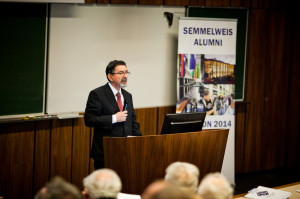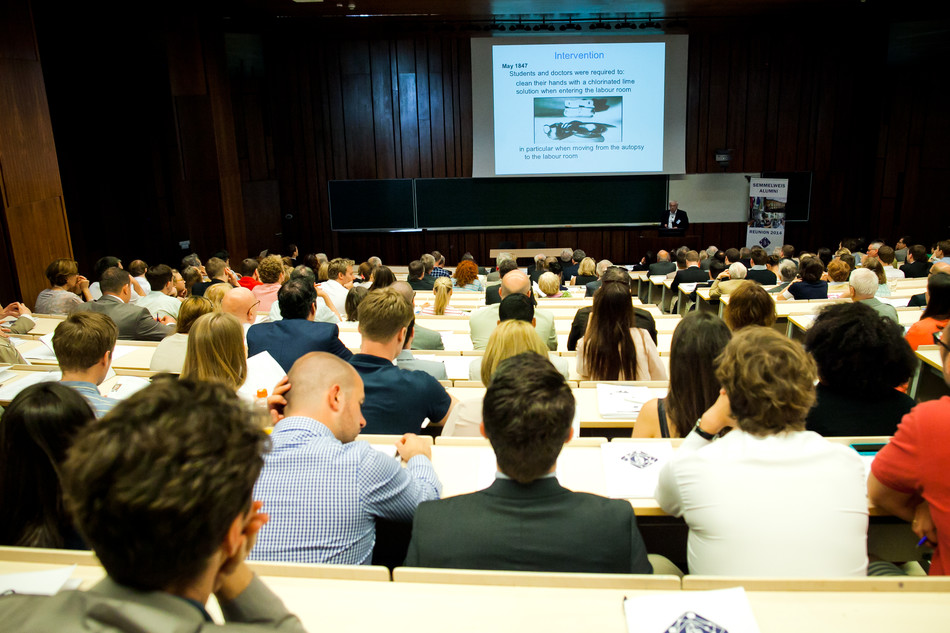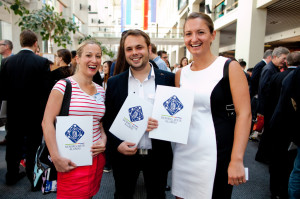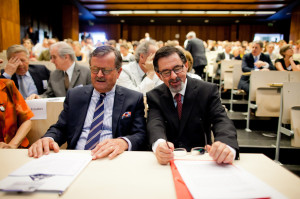Participants arrived to the Jubilee International Alumni Meeting – held at the Centre of Theoretical Medicine – from dozens of countries of four continents. Semmelweis University organises international alumni reunions every five years; on this occasion the 30 years anniversary of the foreign language programme was also celebrated.
 Dr. Ágoston Szél, rector of Semmelweis University referred to the establishment of the German language programme over three decades ago as a success story. “I am proud that the dream of our predecessors that was started to be realised 30 years ago – in spite of the evident and numerous administrative and organisational difficulties – has become a success story.” He reminded the audience that courses are taught in three languages at the various faculties. Quarter of the students – almost 3000 – are foreign citizens and almost every second student at the Faculty of Medicine comes from one of the over 70 countries with which the University has established an academic relationship in the course of the last three decades.
Dr. Ágoston Szél, rector of Semmelweis University referred to the establishment of the German language programme over three decades ago as a success story. “I am proud that the dream of our predecessors that was started to be realised 30 years ago – in spite of the evident and numerous administrative and organisational difficulties – has become a success story.” He reminded the audience that courses are taught in three languages at the various faculties. Quarter of the students – almost 3000 – are foreign citizens and almost every second student at the Faculty of Medicine comes from one of the over 70 countries with which the University has established an academic relationship in the course of the last three decades.
 He added that Universities’ reputations are elevated to true greatness by two things: traditions and the ability to innovate. According to him the establishment of the foreign language programme stands as the greatest innovation in Semmelweis University’s history. He recalled that in academic year of 1983/84 the German Language Programme was launched with 120 students which was soon followed by the English Programmes in medicine, dentistry and pharmacy.
He added that Universities’ reputations are elevated to true greatness by two things: traditions and the ability to innovate. According to him the establishment of the foreign language programme stands as the greatest innovation in Semmelweis University’s history. He recalled that in academic year of 1983/84 the German Language Programme was launched with 120 students which was soon followed by the English Programmes in medicine, dentistry and pharmacy.
“Today we know that not only we were mature enough to take on that task but the investment was returned a hundredfold. The participation in the foreign language programme was a privilege for us and our Hungarian students, the University as well as the whole country profited from it.” – emphasised Dr. Ágoston Szél highlighting the roles of Professor Attila Fonyó and Professor Anna Kádár. The former headed the then revolutionary new German language programme while the latter tailored the foreign language education to the environment of the post system change era. He expressed his appreciation to the two leaders of the Foreign Students’ Secretariat: to Dr. Erzsébet Ligeti and Dr. Márk Kollai as well as to their colleagues, Magdolna Fonyó and Olga Ványi. According to the Rector without the contributions of the rector and dean of the McDaniel College, Dr. Attila Horváth and Dr. László Frenyó, Semmelweis University’s foreign language programmes and the event could not have been realised.
 The Rector also mentioned that the Alma Mater connects Semmelweis graduates to one another even if they end up working in different countries and continents upon graduation. He also expressed his appreciation to the alumni on behalf of the Hungarian students because the extensive extra knowledge acquired and adapted from the English textbooks substantially increased the standards of teaching in Hungarian as well. Additionally, the tuition fees allowed for many investments and at times the mitigation of daily financial issues. The most important thing according to him is that the successes of the alumni throughout the world consequently spread the good reputation of Semmelweis University as well.
The Rector also mentioned that the Alma Mater connects Semmelweis graduates to one another even if they end up working in different countries and continents upon graduation. He also expressed his appreciation to the alumni on behalf of the Hungarian students because the extensive extra knowledge acquired and adapted from the English textbooks substantially increased the standards of teaching in Hungarian as well. Additionally, the tuition fees allowed for many investments and at times the mitigation of daily financial issues. The most important thing according to him is that the successes of the alumni throughout the world consequently spread the good reputation of Semmelweis University as well.
 The Rector also touched upon the triadic role of academic health centres: education, research and healthcare. Research is indispensable because the university’s mission is not only to confer knowledge on students, but also to gain and teach new perspectives. Semmelweis University was awarded the Research University title for the second time therefore it fulfils this requirement. “We are convinced that Semmelweis University’s success – besides your enthusiasm and desire to improve – is the fact that our University’s leaders ensure that the detailed curriculum based on thorough theoretical and practical knowledge is continuously developed and kept up to date” – emphasised the Rector.
The Rector also touched upon the triadic role of academic health centres: education, research and healthcare. Research is indispensable because the university’s mission is not only to confer knowledge on students, but also to gain and teach new perspectives. Semmelweis University was awarded the Research University title for the second time therefore it fulfils this requirement. “We are convinced that Semmelweis University’s success – besides your enthusiasm and desire to improve – is the fact that our University’s leaders ensure that the detailed curriculum based on thorough theoretical and practical knowledge is continuously developed and kept up to date” – emphasised the Rector.
He concluded his speech with the words of Nobel laureate and Semmelweis Budapest Award winner Professor George A. Olah: “We need to invest in the future and the best investment a country can make is the education of youth. – I believe that the admonitions of the Hungarian-born master – who will always remain Hungarian to our minds – have been completely fulfilled.” – said the Rector.
 The Reunion’s guest of honour was Dr. Frank Ulrich Montgomery, president of the German Medical Association who travelled to Hungary for the Alumni Reunion. “The creation of the German language programme 30 years ago – before the fall of the Iron Curtain – was an indication of significant foresight and wisdom”. He added that the perfection and success of the programme’s implementation is underlined by the fact that numerous European universities followed Semmelweis University’s example. More than 30 institutions have introduced German and English language programmes Europe-wide.
The Reunion’s guest of honour was Dr. Frank Ulrich Montgomery, president of the German Medical Association who travelled to Hungary for the Alumni Reunion. “The creation of the German language programme 30 years ago – before the fall of the Iron Curtain – was an indication of significant foresight and wisdom”. He added that the perfection and success of the programme’s implementation is underlined by the fact that numerous European universities followed Semmelweis University’s example. More than 30 institutions have introduced German and English language programmes Europe-wide.
According to Dr. Frank Ulrich Montgomery around 3,000 German doctors work in Germany who pursued their studies fully or partially in Budapest. Every one of them integrated into the German medical society without a problem which also proves the high standards of the medical education in Budapest.”
Gina Varga-Gönczi
Szilvia Tóth-Szabó
Translated by: Bonifac Makkai
Photos: Attila Kovács – Semmelweis University

